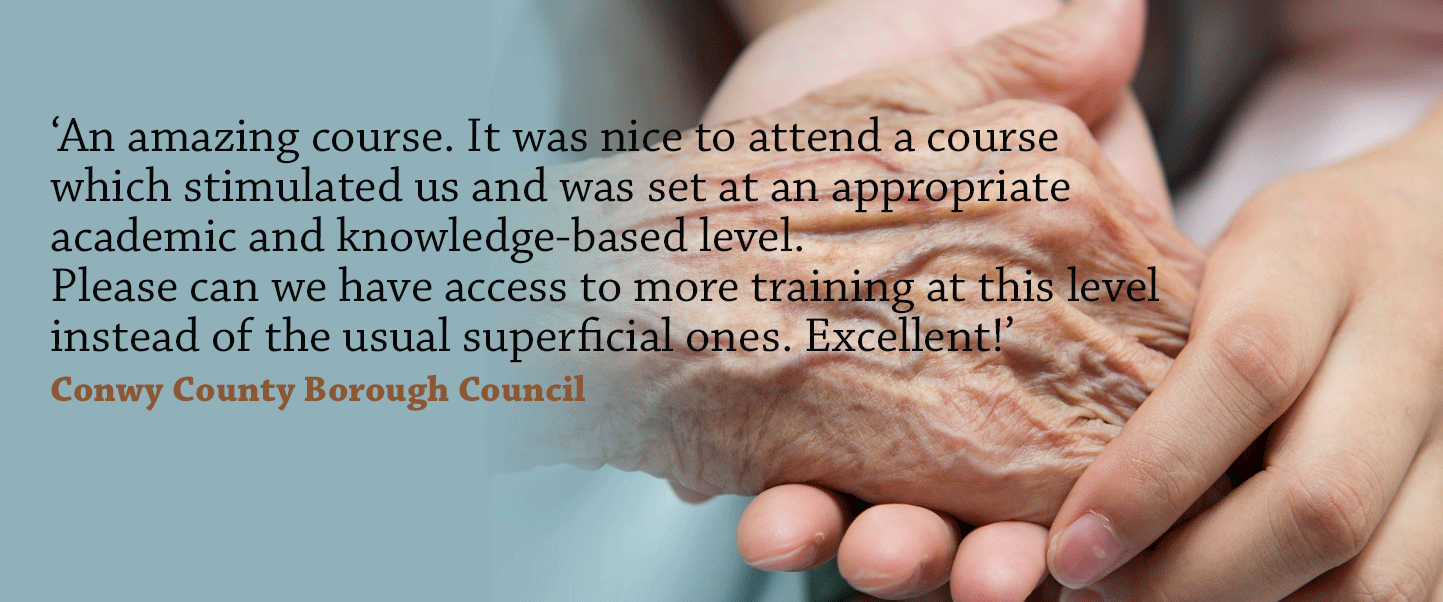The UK’s leading providers of mental health training & consultancy – bespoke-designed to meet your needs.
This training is dedicated to improving the understanding of, and care for, individuals suffering with a range of cognitive and organic illnesses or diseases of the brain. This training will help participants to put behaviours into a context and will improve carer’s ability to provide support for the client by better-understanding and pre-empting the inherent challenges. There will be a focus on the person with dementia as a unique individual; the importance of knowing their background and life history; abilities people with a dementia retain in spite of the difficulties they face; how dementia impacts on families, friends and community and the support that is needed.
Please click the leaflet images to download a PDF overview of this training
Dementia and neurocognitive disorders training. The assessment, psychology, psychiatry and neurology of brain disease and associated illness.
We are a leading expert in mental disorder and provide high quality, integrated and evidence-based training to an international client base. This unique event draws science and solutions from a breadth of behavioural psychology and psychiatric sciences and is delivered by qualified experts. Importantly!
Content to this training
- Aetiology and causes of Dementia
- Classifying the many different types of Dementia including:
o Alzheimer’s variant;
o Vascular Dementia;
o Fronto-Temporal Dementia (language and behavioural variants);
o Lewy Body variant Dementias;
o Alcohol-related Dementia and management;
o Diogenes Syndrome and executive dysfunction;
o Other Dementias - Symptoms, assessment and progression of illness;
- A structured study of associated difficulties in communication, movement, cognition and behaviour;
- Comorbid psychiatric illness, including depression, delirium and psychosis;
- Comorbid physical health complications;
- Learning to manage expectations and improve interactions.
- Issues surrounding capacity and the law,
Learning Objectives: - Understand what Dementia is and the difficulties that will present for the patient;
Understand the diagnostic process and the key concerns to community safeguarding - Understand the different types of Dementia and their associated challenges;
- Understand the stages of Dementia and better manage the associated cognitive and physical difficulties;
- Recognise other comorbid health presentations;
- Better-manage challenging behaviour.
- Help to provide dignity and effective management in the best interest and liberty of a client with dementia.
- Issues associated with hoarding behaviours and self neglect
- Assessment of capacity, The Mental Capacity Act, The Mental Health Act, The Court
- Protection and Human Rights law
Evidence based training
This evidence-based training is delivered by a psychology / psychiatry qualified facilitator. It delivered in an accessible style that meets delegates’ learning / communication needs. We have extensive training experience within this sector and can support delegates with free post-training support on an informal basis. This training is a one-day event and can be delivered vis webinar or onsite / face-to-face.
Training facilitators:
This training is delivered by facilitators trained in psychiatry and specialise in general psychiatric illness and abnormal psychology, personality disorder and neurocognitive disorders / delirium. We offer a wide-ranging, multi-disciplinary knowledge and skills with high quality, integrated evidence-based training that you can trust.
The training provides a focus on the different types of dementia and the key characteristics of each; The different areas of the brain and how dementia affects these areas; a focus the process of diagnosis and its impact; practical strategies to assist with individuals with dementia.
Why involve our team?
We are a leading expert in mental disorder and provide high quality, integrated and evidence-based training to an international client base. This unique event draws science and solutions from a breadth of behavioural psychology and psychiatric sciences and is delivered by qualified experts. Importantly! We offer free-training support on an informal basis.
Bespoke training workshops can be provided.



